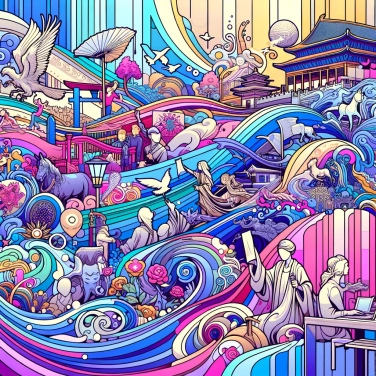Frida Kahlo became a feminist icon in Mexican art due to her commitment to women's rights, her honest portrayal of pain and female strength in her artistic works, and her ability to defy the gender norms of her time.
Frida Kahlo was never afraid to confront the representations of the female body head-on. She openly paints her own physical sufferings after her terrible accident: multiple fractures, miscarriages, chronic pain. Through her raw yet touching paintings, she reveals her bodily intimacy as it is, without filters or idealization. She also highlights her scars, her medical corset, and her inner wounds to show the harsh reality of her suffering. This direct honesty in the representation of the female body and pain shocked at the time but still fascinates today. Her daring works break the taboo surrounding women's bodies, boldly asserting that their experiences deserve to be represented without shame, in all their complexity and fragility.
Frida Kahlo rejects the usual labels that confine Mexican women of her time. She wears traditional Mexican clothing, a sign of embraced cultural identity, while asserting her right to an existence separate from the norms imposed on women. Through her self-portraits, she creates a unique, strong, and sometimes provocative image, far from the expected feminine clichés. Married to the famous artist Diego Rivera, Frida never defines herself solely by this marital link: she clearly presents herself as an independent artist and openly chooses to lead her emotional life with freedom, outside the overly strict rules of her time. Her assertive attitude significantly contributes to her becoming a symbol for women seeking a liberated and embraced feminine identity.
Frida Kahlo was politically involved, notably through the Mexican Communist Party, to advocate for social equality and women's rights. She actively campaigned against the oppression, violence, and injustice faced by Mexican women in her time. In her works and daily life, she openly claimed freedom and women's emancipation in the face of a conservative and macho society. She also participated in activist gatherings, openly expressing her support for women's rights and her rejection of the established patriarchy. Her clear political stance and strong positions helped inspire and boost the feminist movement in Mexico and beyond.
Frida Kahlo clearly shook up preconceived ideas by showcasing a free and assertive femininity, far from the criteria imposed by men. With her famous thick eyebrows and unapologetic mustache, she unapologetically rejects what is traditionally expected of a woman. Her refusal to conform to beauty standards imposed by a macho society is a powerful symbol of resistance. She does not stop there: in her paintings, she frankly explores taboo themes such as female sexuality, miscarriages, and her physical suffering, which were typically silenced or ignored in her time. By openly living an independent and passionate life, marked by an embraced bisexuality and free romantic adventures, she directly challenges the dominant patriarchal model and becomes a strong figure of women's emancipation.
Frida Kahlo still influences a lot of feminist artists today who resonate with her struggles and creative strength. Her bold and personal style continues to inspire contemporary creators in various fields such as painting, photography, fashion, and even illustration. Artists like Judy Chicago, known for her militant and feminist work, recognize Frida Kahlo as a major and essential figure. Her difficult journey, authenticity, and direct way of expressing her feminine identity and pain still deeply resonate with artists committed to fighting against discrimination. Today, the image and symbols associated with Frida continue to be used to assert the freedom and emancipation of women through art.
Although often exclusively associated with Mexico, Frida Kahlo's art was largely influenced by European artistic movements, particularly surrealism, even though she herself never identified as a surrealist artist.
After suffering a serious accident at the age of 18, Frida Kahlo began painting from her bed, which significantly influenced her introspective and courageously introspective style.
Frida Kahlo was deeply politically engaged: she joined the Mexican Communist Party and maintained a close friendship with Leon Trotsky during his exile in Mexico.
The 'Casa Azul' (Blue House), Frida Kahlo's home in Mexico City, is now a popular museum attracting thousands of visitors each year who seek to gain a deeper understanding of her personal and artistic life.
Frida Kahlo inspires contemporary feminist artists through her expressive authenticity, her independent and bold artistic journey, and her courage in addressing sensitive topics related to gender, identity, and psychological and physical pain. Many adopt her introspective and uncompromising approach as a model for empowerment and a fight against gender stereotypes.
Frida Kahlo's painful experiences, particularly her tragic accident, her struggle against illness, and her complex relationship with Diego Rivera, shaped her perspective on the female condition and drove her to challenge the patriarchal norms of her time. Her authentic lived experience, her strength in the face of adversity, and her independence have profoundly inspired generations of women.
Beyond Mexico, Frida Kahlo has become emblematic due to the emotional universality and courage of her work. Her art breaks taboos by openly exposing female suffering and critiquing gender inequalities. Her radical image and political commitment to minorities and women continue to inspire people in many countries around the world.
Among the frequent symbols in Frida Kahlo's work are the wounded body, animals (monkeys, dogs, and birds often representing emotional attachment), traditional Mexican clothing as a statement of identity and feminism, as well as elements of nature that evoke a connection to her deep cultural roots.
The works of Frida Kahlo primarily address physical and emotional suffering, identity issues, the female experience, as well as Mexican politics and folklore. She often uses self-portraits to tell her personal story in connection with these major themes.

12.5% of respondents passed this quiz completely!
Question 1/6